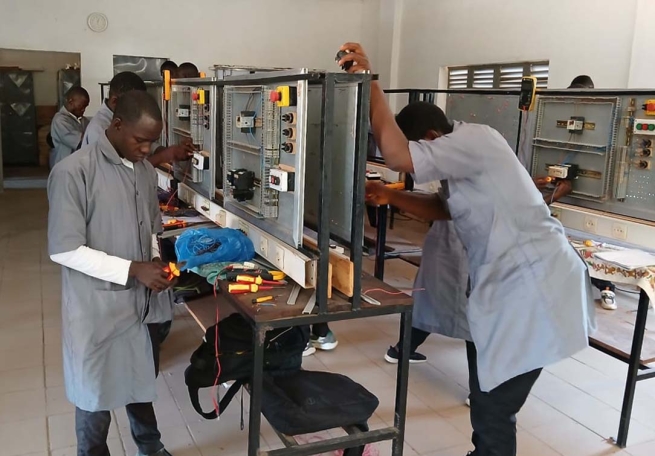Donor funds were used to purchase training equipment for the St. John Bosco Centers in the two communities. The donation impacted 880 youth including 130 young women, ages 16-25, from the Kankan and Nzérékoré regions. The students come from families with low levels of education who earn their living mainly through the subsistence economy.
A Salesian explained, “Thanks to the additional training equipment available, the St. John Bosco Centers have been able to increase the number of classrooms where young people can receive training. This has made it possible to offer training to even more youth. In Siguiri, we have gone from 61 students in 2022-2023 to 100 students in 2023-2024. Similarly in Kankan, we have gone from 165 pupils in 2022-2023 to 181 pupils in 2023-2024. This project has been a great success.”
One of the students impacted was Emmanuel, who is attending vocational training at the center in Siguiri. He said, “The reason I came to the center was because I failed secondary school. I tried several times without success to take the baccalaureate exam, even though I had difficulty reaching the final year of secondary school. My classmates and parents advised me to do vocational training. I decided to train in building electricity and I’m in my second year.”
Emmanuel believes vocational training is important. He added, “My advice to my Guinean colleagues is to tell them that vocational training has a lot of advantages. We study to gain skills and a technical diploma that are in demand in companies. We can find work but also set up our own business and work privately to earn a living. That’s why I encourage my fellow students, because I’m proud to be doing vocational training.”
Despite its enormous human and natural potential, the Republic of Guinea is one of the world’s poorest countries. In the northeast of the country, about 74% of the population lives in extreme poverty. In other areas, many look to subsistence farming and employment in the informal sector, because people do not have the skills for the formal labor market.
The lack of prospects, but also the violations of human rights and ethnic tensions have led many Guineans to undertake the arduous journey to Europe. The number of asylum seekers originating in the country has risen sharply in Europe in recent years.
Source: Mission Newswire


